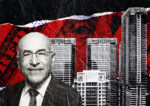Trending
Union wages are taking a huge bite out of hotel restaurant profits
Hoteliers say it’s become prohibitively expensive to run a high-end restaurant

Manhattan’s hotel restaurants used to be culinary extensions of their 5-star digs: luxurious dining experiences with the white-glove atmospheres to match.
But recent years have been tough for the hotel restaurant business.
Food and beverage profits fell by nearly 40 percent in the three-year period ending in 2017, according to the hotel data-tracking firm STR.
F&B profits tumbled to just shy of $630 per available room that year – the most recent for which STR has data – from more than $1,000 per available room in 2014.
The reason for the pinched profits, industry sources say, is the strong wage increases the powerful hotel workers union negotiated as part of their most recent industry-wide contract.
“It’s an ongoing struggle, and there’s just no way to get out from under that [contract] if they’re in it,” said John Williams, co-founder and president of the travel company New York Guest.
Peter Ward’s New York Hotel and Motel Trades Council – whose Local 6 union represents bar and restaurant workers – sat down with the Hotel Association of New York representing hotel owners to negotiate a new industry-wide contract in 2012. The contract, which was extended three years later through 2026, gives workers stepped-up wage increases each year.
Between 2014 and 2017, food and beverage labor costs climbed 10.5 percent to an average of $19,597 per room, according to STR’s data. During that same period, F&B revenue fell by nearly 1 percent.

HANY president Vijay Dandapani
A spokesperson for Vijay Dandapani, who became president of HANY in 2017, acknowledged the rising expenses, but said labor costs are just one piece of the equation.
“While expenses have gone up, each individual hotel operator makes decisions based on a variety of considerations, including labor, cost of retail space, that can halve alternative uses and changing customer preferences,” the spokesperson said.
A spokesperson for the Hotel Trades Council declined to comment.
The restaurant industry has had its struggles, even without the HTC contract.
The number of restaurants open nationwide dipped by 1 percent last spring from a year earlier to 660,755, according to market research group NPD Group. That’s the lowest level in the past dozen years.
James Parrott, director of economic and fiscal policies at The New School, said that the union negotiated its contract in the midst of a growing economy. And he pointed out that the state’s minimum wage has more than doubled from $7 per hour in 2013 to $15 per hour.
“The hotel workers are not getting anything that’s out of line with the broader economy and wage levels of less skilled workers,” he said.
Still, rising wages have impacted hotels’ offerings.
The city’s largest hotel – the 2,000-room Midtown Hilton on Sixth Avenue – discontinued its food and drink service in 2013, replacing it with grab-and-go in the lobby. (The hotel reportedly paid a $4 million-plus severance package to 43 union employees.)
The Plaza Hotel replaced its famed Oak Room restaurant with a food hall run by celebrity chef Todd English. The Hudson Hotel replaced its F&B with an Umami Burger hamburger outpost, which closed last year.
“The Hudson is a great example. It had a thriving bar and restaurant, and in order to keep the property from being unprofitable, they completely retooled it to a cafeteria-style service environment,” said Douglas Hercher, a principal at the hotel investment-sales brokerage RobertDouglas. “It’s the exception, not the norm, that you have a full-service, three-meals-a-day restaurant.”
“I think that every hotel that we have worked on that is subject to the union has reduced its F&B footprint,” he added. “You see a lot of hotels going to the grab-and-go concept, largely because of union requirements.”
In order to get around the union rules, many hotels are renting out their space to third-party operators that are not subject to the union agreement.
And it helps to have a celebrity chef.
The Four Seasons downtown, for example, has a steakhouse run by Wolfgang Puck.
GFI Capital’s Beekman Hotel in Lower Manhattan has two restaurants run by Tom Colicchio (co-founder of the Gramercy Tavern) and Keith McNally, whom the New York Times once described as “the restaurateur who invented Downtown.”
Joel Rosen, president of GFI Hospitality, said a hip restaurant helps create buzz around a hotel, but the revenues and expenses still have to line up.
“Obviously, the economic considerations are important. It doesn’t matter at the end of the day when you’re looking at your labor costs if you can’t get people to sit in your restaurant,” he said.




